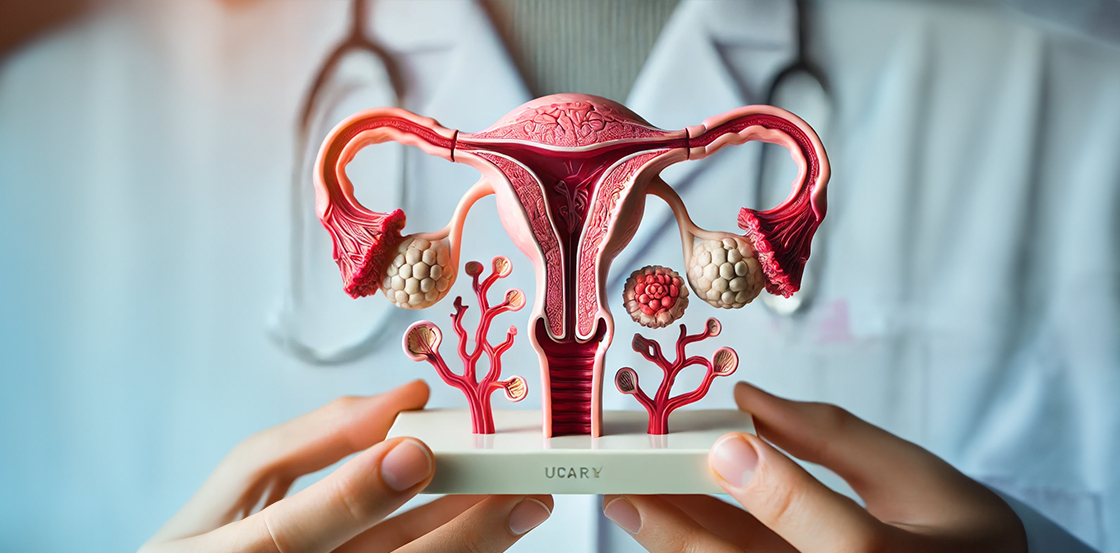Post link copied to clipboard!

Consultant Gynaecologist and Lead Gyn Oncologist, Mr Vivek Nama, explains what is the best treatment for adenomyosis. Mr Nama is a private gynaecologist practising at Top Gynaecologists London, UK.
Adenomyosis happens when the endometrial tissues lining the uterus grow into the uterus’s muscular wall, called myometrium. It is also known as internal endometriosis because the uterine lining grows inside the uterine wall.
During menstruation, adenomyosis tissue swells up and bleeds inside the uterine wall. It is the reason behind severe pain, cramps and heavy periods.
There are several causes for heavy and painful periods. Commonly known conditions include fibroids and endometriosis. A point of fact is that fibroids and endometriosis can coexist with adenomyosis.
As mentioned earlier in this article, adenomyosis symptoms include heavy and painful periods. Women experiencing adenomyosis will often have an enlarged uterus. It can present as a lump in the lower abdomen.
Adenomyosis symptoms also constitute bladder and bowel pressure, causing urinary inconsistency and constipation. Having highlighted the adenomyosis symptoms, let me tell you this. Most women do not experience any symptoms. They are asymptomatic!
We can diagnose the condition with the help of physical examination, MRI scanning, ultrasound or biopsy. Adenomyosis is often challenging to identify since the symptoms are common. Numerous women in the UK continue to live with this condition without any proper diagnosis or adenomyosis treatment.
Adenomyosis can lead to anaemia (an adverse condition where blood produces red blood cells lower than usual) due to heavy menstrual bleeding. If you’re facing heavy periods affecting your daily routine, consider booking an appointment or getting a video consultation with our Consultant gynaecologist, Mr Mahantesh Karoshi.
Remember that, suppose adenomyosis becomes challenging for your quality of life, get your adenomyosis treatment with the help of the best gynaecologists in Gloucester Road, London.
The first line of adenomyosis treatment includes medication to lower the pain caused by periods. Very often, our private gynaecologists offer analgesic and antispasmodic medicines. We also recommend tranexamic acid to manage bleeding for our patients. Sometimes, contraceptive pills intake can stop the periods and alleviate your adenomyosis symptoms.
However, we don’t recommend consuming back-to-back contraceptive pill intake. Our private gynaecologists suggest you visit our gynaecology clinic in London.
Uterine artery embolisation (UAE) is a safe and effective adenomyosis treatment option. In reality, the UAE isn’t entirely reserved for fibroid treatments. For severe cases, we prefer hysterectomy, where other adenomyosis treatments are ineffective.
When you’re facing heavy or painful periods, always remember to consult with a gynaecologist. An expert private gynaecologist will help you diagnose adenomyosis with the help of advanced technology and state-of-the-art medical approaches.
Our best gynaecologists in London approach the treatment holistically in the initial stages. Afterwards, we will check the efficacy of the treatment. If the patient doesn’t show any lowering of symptoms, we’ll suggest uterine artery embolisation.
Remember to read our latest insights and informative blogs on women’s wellness and fitness.
Adenomyosis is a medical condition occurring when the tissue that usually lines the inside of the uterus (endometrium) begins to grow into the muscular wall of the uterus (myometrium). This condition can cause the uterus to become enlarged, tender, and painful, especially during menstruation.
Curing adenomyosis may be challenging. However, treatments are available to manage the symptoms effectively. Adenomyosis treatment depends on the severity of your condition and your personal preferences. Consulting a private gynaecologist with expertise in adenomyosis treatment in London is essential to determine the most suitable treatment plan for your specific needs.
The best treatment for adenomyosis depends on your individual circumstances and the severity of your symptoms. Consult with a gynaecology specialist in adenomyosis treatment in London to determine the most suitable approach for you. Treatment options include medication, lifestyle changes, and, in severe cases, surgical procedures like hysterectomy.
Endometriosis and adenomyosis are two distinct but sometimes overlapping conditions that affect the female reproductive system:
Endometriosis causes pelvic pain, painful menstruation, and fertility issues.
Adenomyosis involves the abnormal growth of endometrial tissue into the muscular wall of the uterus. Symptoms include heavy or prolonged menstrual bleeding, pelvic pain, and an enlarged uterus.
While both conditions can cause pelvic pain and menstrual problems, they have different causes and locations within the reproductive system. A healthcare professional can accurately diagnose and differentiate between the two conditions to provide appropriate treatment.
While surgery may be an option for severe cases of adenomyosis, there are non-surgical approaches to manage the condition. These can include:
Medication: Your doctor may prescribe pain relievers, anti-inflammatory drugs, or hormonal treatments such as birth control pills, intrauterine devices (IUDs), or GnRH agonists to alleviate symptoms.
Lifestyle Changes: Adopting a healthy lifestyle can help manage adenomyosis symptoms. Maintaining a balanced diet, regular exercise, stress management, and adequate sleep can contribute to overall well-being.
Alternative Therapies: Some individuals find relief through complementary therapies like acupuncture, herbal supplements, or pelvic physiotherapy. Discuss these options with your healthcare provider.
While both conditions can cause pelvic pain and menstrual problems, they have different causes and locations within the reproductive system. A healthcare professional can accurately diagnose and differentiate between the two conditions to provide appropriate treatment.